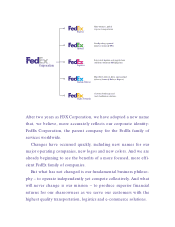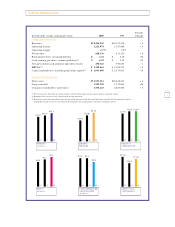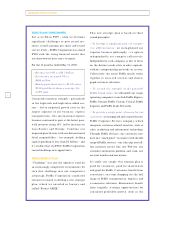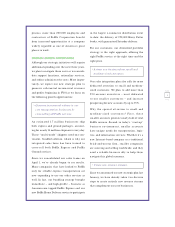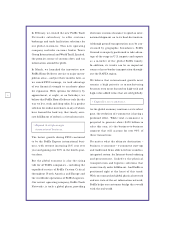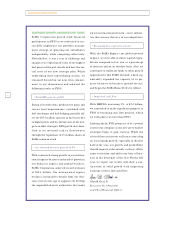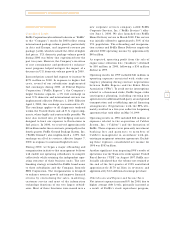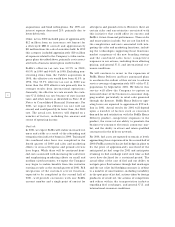Federal Express 2000 Annual Report Download - page 12
Download and view the complete annual report
Please find page 12 of the 2000 Federal Express annual report below. You can navigate through the pages in the report by either clicking on the pages listed below, or by using the keyword search tool below to find specific information within the annual report.
10
and higher average weight per package were the
prim ary factors in revenue growth. List price
increases and other yield-managem ent actions
contributed to the yield im provement in 1999.
The U.S. deferred package growth rate declined in
1999 in large part due to specific management
actions to restrict growth of these lower-yielding
services. IP package volume and international
freight pounds and yield were negatively affected
by weakness in Asian m arkets, especially in U.S.
outbound traffic destined for that region.
Other revenue included Canadian domestic rev-
enue, charter services, logistics services, sales of
hushkits and other. Revenue from hushkit sales
has continued to decline over the past three years
and is expected to be negligible hereafter.
O perating Incom e
Operating incom e increased 3% in 2000 despite
higher fuel costs and costs associated with the cor-
porate realignm ent and reorganization of the sales,
m arketing and inform ation technology functions.
A 48% increase in average fuel price per gallon had
a negative im pact of approxim ately $260 million
on 2000 fuel costs, including the results of jet fuel
hedging contracts entered into to m itigate some of
the increased jet fuel costs. Fuel surcharges im ple-
m ented during 2000 offset the increase in fuel
costs in the fourth quarter. As anticipated, m ainte-
nance and repairs increased in 2000 due to the
tim ing of scheduled maintenance and a greater
num ber of routine cycle checks resulting from
fleet usage and certain Federal Aviation
Adm inistration directives.
Operating incom e increased in 1999 com pared to
1998 in spite of $81 m illion in strike contingency
costs in 1999 and continued weakness in Asian
m arkets. Lower fuel prices and cost controls, includ-
ing adjustm ents in network expansion and aircraft
deploym ent plans, contributed to improved
results. A decline in average jet fuel price per gal-
lon of 23% was partially offset by an increase in
gallons consum ed of 6% . Although international
freight pounds and revenue per pound continued to
decline in 1999, higher yielding IP volume contin-
ued to grow, utilizing capacity otherwise occupied
by freight.
In 1998, operating incom e improved as package
yield increased at a higher rate than costs. An
increase in average daily packages also contributed
to the improvement in operating incom e. In 1998,
fuel expense included amounts paid by FedEx
Express under jet fuel hedging contracts that were
designed to m itigate some of the increased jet fuel
costs. Lower international freight yield, rising
expenses associated with international expansion
and foreign currency fluctuations along with
expenses of $14 million related to the acquisition
of Caliber negatively affected 1998 results. Oper-
ating incom e for 1998 increased approximately
$50 million related to the UPS strike. Proceeds
from a 2% temporary fuel surcharge on U.S.
dom estic shipm ents through August 1, 1997 also
had a favorable impact.
Year-over-year comparisons were also affected by
fluctuations in the contribution from sales of
hushkits. Operating profit from these sales declined
$50 million in 2000 and $30 m illion in 1999.
O utlook
We believe U.S. overnight package volum es for
FedEx Express will grow in 2001 at rates higher
than those experienced in 2000, with second half
growth rates exceeding those in the first half of
2001. We believe U.S. deferred package volum e
growth rates at FedEx Express will be lower in 2001
as we im plement the strategy of shifting a portion
of these shipments to FedEx Ground. Im proved
dom estic yields associated with the new sales ini-
tiatives are also expected in 2001. We expect IP
package volum e growth rates to rem ain strong in
2001. Freight pounds are expected to continue to
increase in 2001, with increases in the U.S. partially
offset by continued declines in international freight,
as it is replaced by higher-yielding priority packages.
FedEx Express also plans to continue cost contain-
m ent and productivity enhancem ent program s in
2001. By lowering discretionary spending and lim it-
ing staffing additions, we expect to align control-
lable costs with business growth; however, these
actions will not affect plans for strategic spending
in support of long-term growth goals.


